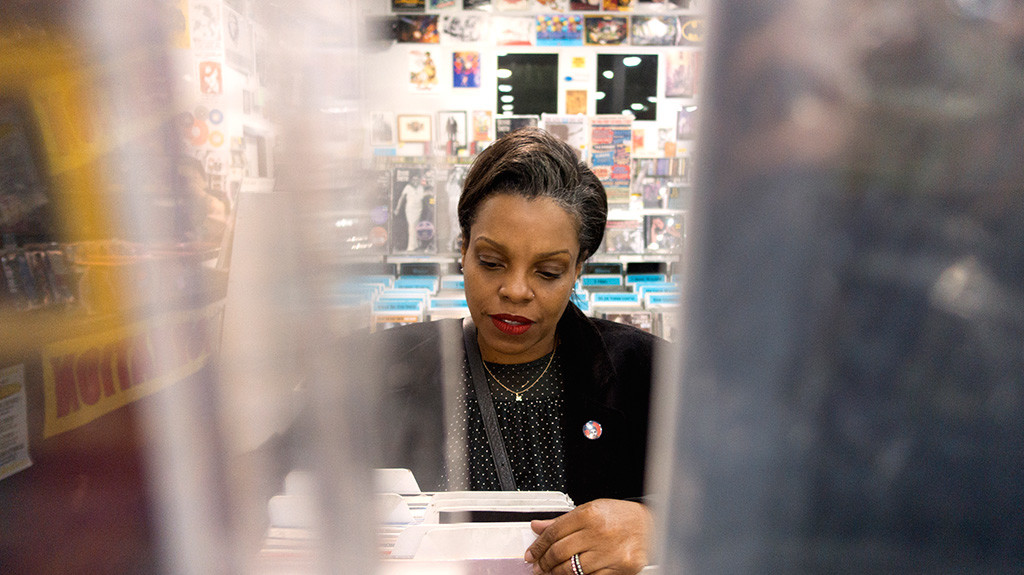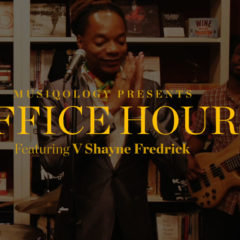Morgan Rhodes is a lot of things: Music lover. Music fan. DJ of the soulful underground. And Ava DuVernay’s perennial music supervisor.
Last week we celebrated the birthday of Martin Luther King, Jr. We were glad to see so many folks take the time to check out Ava DuVernay’s latest theatrical release, Selma, which chronicles Martin Luther King’s involvement in the historic march across the Edmund Pettus Bridge in 1965. With that in mind, we thought that this was the perfect moment to learn more about Morgan, her journey with music, and her vision for selecting the music for Selma.
Recently, Morgan was gracious enough to speak with Musiqology Managing Editor, Fredara M. Hadley by phone. Follow Morgan at @MorganRhodes.
FMH: Let’s start with Selma. I read the interview you did with EW.com and you were discussing how it was important to you to not go for the super well known and super obvious choices in terms of music. Could you talk a little bit more about why you took that route with your selections?
MR: Ava DuVernay and I are on our fourth project together, second feature and lesser known songs were Ava’s request. She’s got a great ear and when we met about this project early last year she said, “So, I want to use music from the time [period] and I want to use underground hits and B-sides.”
I’m a DJ and I play underground music all the time, so I thought, “This is awesome.” I was also excited because this meant I would have the opportunity to do some research. I’m just glad that she asked me to do that because I think this piece of the Civil Rights Movement hasn’t really been presented this way. And I thought it might be powerful to use music that you might not be as familiar with, so in these moments you are not thinking, “Oh that’s ‘A Change is Gonna Come’ or ‘We Shall Overcome.’”
The things that were happening on screen were so powerful that I wanted you to concentrate on those.
FMH: I want to say that you all were really successful in achieving that. One of the things that was so striking to me is how, in a lot of ways, the music was so understated. If you think about a show like Scandal, which uses music in a very different way to amplify and intensify the moments on screen, this was the opposite approach.
I wanted to talk with you about one of my favorite musical moments in the film, the Martha Bass record, “Walk with Me.”
Morgan: First of all, and I shared this on another interview, just getting to that song was nothing short of God. So let me give God the credit for that. Until then I was only familiar with Fontella [Bass]. I’m a huge fan of Cinematic Orchestra and the work that she had done with them. But this song featured her mother, Martha Bass. I actually found that song on YouTube. There are two versions of it. The one that we used was with the Harold Smith Majestic Singers. It’s from an album of Negro Spirituals covered by different artists. So I heard it on Youtube, but it wasn’t available anywhere. I was like, “I’ve got to have this song.” But then, I was in panic mode because I loved it. But how do I find it? I was able to find a record collector who had one copy and it was pristine. It still had the shrink wrap on it. I sent that song to Ava and she loved it. So that’s how that worked out.
FMH: Her vocal delivery is kind of amazing because she sounded so much like Mahalia, but there was something a little different in her voice that made me keep questioning myself. Then the arrangement was more of a funk-based sound.
MR: Checker Records was a great home for soul music, so it had me wondering, how did this gospel record end up on Checker. But I think it speaks to that combination of funk, soul, and gospel that are in that song.
But as I said before, you can’t separate Dr. King from his faith, nor can you separate the Civil Rights Movement from the faith that undergirded that Movement. So it’s very important to have gospel music and hymns in there, and certainly Negro Spirituals too. But that was the record, that, when I heard it, made me cry. Then I knew I’d arrived at the right place. I kept praying and I kept crying and I said, “This is the one.”
Thank God, Ava agreed.
FMH: I wanted to talk with you about your research process. Keep your trade secrets of course, but generally, how do you conceptually approach a project like Selma?
MR: That’s a great question. My process is very similar to the way that I prepare for my radio shows. I want to draw a connection for people, so I’m fascinated with songs by artists that you know, but the songs that you didn’t know that they recorded. So my goal in this was to connect the dots. So, per Ava’s directions, to find the B-sides. We have “Old Man Trouble.” But when people talk about Otis Redding, they won’t mention “Old Man Trouble.” That’s not the first song that’s going to come to mind and that’s why I liked it. I liked it because it was the B-side to “Respect” which is another song people don’t associate with him; they associate it with Aretha [Franklin].
I’m fascinated with songs by artists that you know, but the songs that you didn’t know that they recorded.
So, for me, the process of finding the stuff was to connect the dots and to dig deep. I went everywhere. I went to record stores. I talked to old school collectors. I went to eBay. I talked to my father about deejays that were big during the Civil Rights Movement because something I learned was the importance of the radio deejay during that time. During their back announcements, deejays would announce the name of the song, but they would also slip in little cryptic hints about where the safe spots were to gather, which roads to avoid. And I thought, “If I were a deejay in 1965, what would I be playing?” The temptation would be to play “People Get Ready,” but I’m an underground deejay so I wouldn’t want to play that. So I’d probably go with, “What the World Needs Now” or “Keep on Pushing.” So it was partly trying to imbue my own sensibilities in there, but I also wanted to get people asking questions.
Thank God for the internet, because there were so many collectors on line who were willing to make deals with me.
FMH: I thought it was a beautiful film on so many levels and when people talk about Selma they talk about the amazing cast, and they should, but one of the things that excites me most is the African Americans working behind the scenes. On this film she had you, Jason Moran, Bradford Young, Arthur Jafa. Can you talk a bit about what that means?
MR: Ava has worked with many of us before. I think it’s cool for there to be so many black folks that work on on her projects, some who are the only black folks that work in their particular area of production. It’s been good to work with Ava, who herself is blazing trails, but also with Bradford who has changed how black people look on screen. And that he’s able marry fair-skin and brown-skin and every shade in between without it looking artificial or harsh on screen.
So I think it’s great for her to have found all of us. So it’s been good to be in this family.
Stay tuned for more of our interview with Morgan Rhodes.
Photo Credit: Alyx Schwarz
Tags: ava duvernay, black films, bradford young, jason moran, morgan rhodes, selma


 Share On Facebook
Share On Facebook Tweet It
Tweet It




![[VIDEO] Revisiting Ava DuVernay’s “The Door” with Music Supervisor Morgan Rhodes](https://musiqology.com/blog/wp-content/uploads/2015/01/morghanrhodes-part-2a-225x225.jpg)











